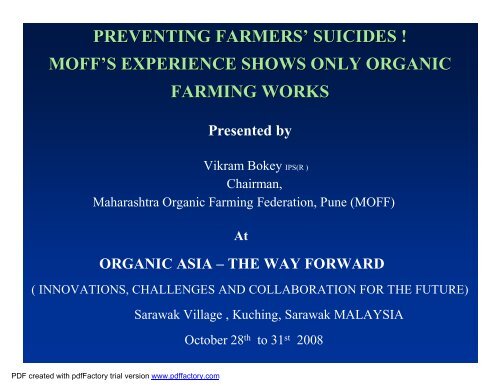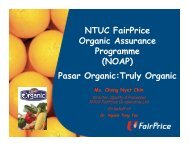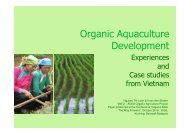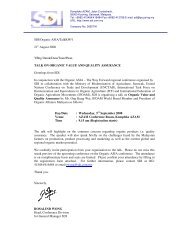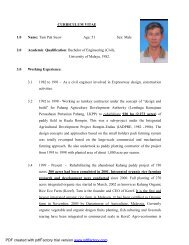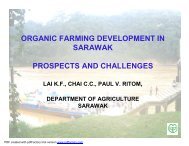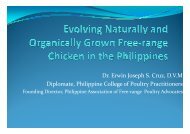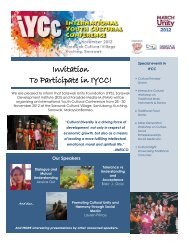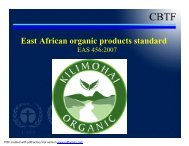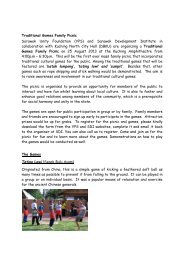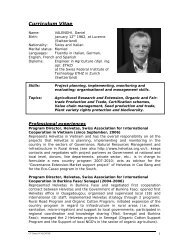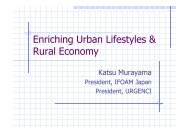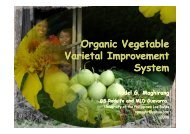VIKRAM BOKEY - Sarawak Development Institute
VIKRAM BOKEY - Sarawak Development Institute
VIKRAM BOKEY - Sarawak Development Institute
You also want an ePaper? Increase the reach of your titles
YUMPU automatically turns print PDFs into web optimized ePapers that Google loves.
PREVENTING FARMERS’ SUICIDES !<br />
MOFF’S S EXPERIENCE SHOWS ONLY ORGANIC<br />
FARMING WORKS<br />
Presented by<br />
Vikram Bokey IPS(R )<br />
Chairman,<br />
MaharashtraOrganic Farming Federation,Pune(MOFF)<br />
At<br />
ORGANIC ASIA – THE WAY FORWARD<br />
( INNOVATIONS, CHALLENGES AND COLLABORATION FOR THE FUTURE)<br />
<strong>Sarawak</strong> Village ,Kuching, <strong>Sarawak</strong> MALAYSIA<br />
October 28 th to 31 st 2008<br />
PDF created with pdfFactory trial version www.pdffactory.com
MAHARASHTRA ORGANIC FARMING<br />
FEDERATION, PUNE<br />
State level federation of :<br />
• Farmers<br />
• Stakeholders<br />
• Environmentalists<br />
• NGOs<br />
• Consumers<br />
PDF created with pdfFactory trial version www.pdffactory.com
Aim<br />
• Transfer of technology for Sustainable Agriculture to farmers at grass<br />
root level<br />
• Promotion of low-cost, no-debt, sustainable production of agricultural<br />
crops & prevent farmers’suicides.<br />
• Training for value addition, grading, packing, labeling & marketing<br />
• Certification of Organic farms<br />
• Women participation & empowerment in Sustainable Agriculture<br />
• Awareness of poison free organic food consumption in the urban<br />
society<br />
• Facilitate marketing of organic food from farmers directly to the<br />
consumers.<br />
• Documentation –Success stories, Innovative Practices, package of<br />
Practices, Data on Economics, Research Papers etc.<br />
• Publications.<br />
PDF created with pdfFactory trial version www.pdffactory.com
• Food & Agriculture Organization -United Nations (FAO -UN)<br />
• International <strong>Institute</strong> For Sustainable Agriculture, Pune(IISA)<br />
• Gene Campaign, New Delhi<br />
Coordination<br />
• Center for Environment Education, New Delhi (CEE)<br />
• Research Foundation for Science, Technology & Ecology, New<br />
Delhi<br />
• The Covenant Center for <strong>Development</strong> (CCD), New Delhi<br />
• Department of Biotechnology, New Delhi (DBT)<br />
• International Competence Center for Organic Agriculture,<br />
Bangalore(ICCOA)<br />
• Organic Farming Association of India, Goa (OFAI)<br />
contd<br />
PDF created with pdfFactory trial version www.pdffactory.com
Coordination<br />
• National Center of Organic farming, Ghaziabad ( UP )<br />
• Commissioner of Agriculture, M.S, Pune<br />
• Department of Agriculture Animal Husbandry & Dairy Science,<br />
M.S.<br />
• Four Agricultural Universities of Maharashtra State<br />
• 120 NGOs – e.g. Panipanchayat, Gramparivartan, NOCA, VOFA,<br />
KVK etc<br />
PDF created with pdfFactory trial version www.pdffactory.com
Network of MOFF, Pune<br />
• Jurisdiction - MaharashtraState<br />
• Head Office - Pune<br />
• Trustees - 10<br />
* 34 Districts<br />
* 140 Taluka<br />
* 15000 Villages<br />
• Apex Council - 127 members ( 3-4 Senior Organic Farmers / District)<br />
• Advisory Board -20 members (Hon. Adv. Manohar Parchure,<br />
Dr. Vijay Bhatkar, Dr. TarakKate,<br />
Dr. Ashwini Ghorpade & others)<br />
• District Heads -34 Organic farmers<br />
• District Coordinators - 68 organic farmers<br />
• Member NGOs - 120<br />
• Farmers in Contact - 1,42,000<br />
PDF created with pdfFactory trial version www.pdffactory.com
Principal Activities<br />
• Establishment of An International <strong>Institute</strong>, for Sustainable<br />
Agriculture,Pune<br />
• “Farmers Suicide Prevention Mission”inVidarbha<br />
• GRAMDOOT Project to convert 25,000 farmers from chemical to<br />
organic farming.<br />
• Self SustainableBiovillage Projects<br />
• Organic Model Farms<br />
• Organic Farm schools – (Every Thursday, 2 hrs Theory & 2 hrs<br />
Practical on organic farms)<br />
• Organic Crop demonstrations<br />
• Trainers’ Training on Organic farming<br />
• Seed Banks of traditional, improved, straight & composite varieties of<br />
major crops (Hybrids & Genetically modified crops Prohibited)<br />
PDF created with pdfFactory trial version www.pdffactory.com
Principal Activities<br />
• Anti. GM. Campaign<br />
• Farmer rallies, seminars, workshops, exhibitions, organic Mandi /<br />
Bazar<br />
• Study tours for farmers in & out of MaharashtraState<br />
• Self help groups of male & female farmers<br />
• Organic farm certification with Participatory guarantee scheme (PGS)<br />
• Farmers’Producer Companies<br />
• Organic food consumers club<br />
• Documentation of organic farmers’ experiences, Innovative<br />
experiments, Success Stories, Technical & research findings, Marketing<br />
data etc<br />
• Leading role in Government’s organic policy<br />
PDF created with pdfFactory trial version www.pdffactory.com
Presentation<br />
Part – I<br />
SUCCESS STORY OF FARMERS’<br />
SUICIDE<br />
PREVENTION MISSION<br />
PDF created with pdfFactory trial version www.pdffactory.com
PROJECT AREA AND POPULATION OF Farmers<br />
District<br />
Area under<br />
cultivation<br />
( hectares)<br />
Population of Farmers<br />
Akola 4,58,000 1,14,000<br />
Buldhana 6,29,000 3,25,000<br />
Amravati 4,98,000 1,36,000<br />
Wardha 4,05,000 1,23,000<br />
Yavatmal 8,03,000 2,85,000<br />
Washim 3,30,000 1,32,000<br />
Total 31,23,000 11,15,000<br />
PDF created with pdfFactory trial version www.pdffactory.com
Project At a Glance<br />
• Title of the Project :- FARMERS’ SUICIDE PREVENTION<br />
MISSION, in VIDARBHA<br />
• Period of the Project :-June 2006 to May 2008<br />
• Area of operation :-Six Districts ofVidarbhaRegion<br />
• Number ofTalukas :-61<br />
• Task Force of the Project :-144<br />
• Targeted main Crops :-Cotton, Soybean, Pigeon Pea, Wheat,<br />
Gram, Groundnut, Orange.<br />
PDF created with pdfFactory trial version www.pdffactory.com
Task Force of the Project<br />
Sr.<br />
No.<br />
Name of Person Designation No Area of operation<br />
1 Shri. Vikram Bokey Chairman 1 Maharashtra State<br />
2 Shri. Diliprao Deshmukh<br />
Baradkar<br />
Vice - Chairman 1 Maharashtra State<br />
3 Smt. Chandraprabha Bokey Principal Project<br />
coordinator<br />
1 Vidarbha Region<br />
4 Shri. SanjaySontakke Project coordinator 1 Vidarbha Region<br />
5 Shri. Jayaprakash Patil District coordinator 1 Akola<br />
6 Shri. Ramesh Deshmukh District coordinator 1 Buldhana<br />
Contd…<br />
PDF created with pdfFactory trial version www.pdffactory.com
Sr.<br />
No.<br />
Name of Person Designation No Area of<br />
operation<br />
7 Shri. Shyam Sawant District coordinator 1 Amravati<br />
8 Shri. SanjayTigaonkar District coordinator 1 Wardha<br />
9 Shri. RamKalaspurkar District coordinator 1 Yavatmal<br />
10 Shri. Narendra Taiwade District coordinator 1 Washim<br />
11 Affiliated NGO<br />
Members<br />
12 Field Staff Village<br />
Ambassadors<br />
(Gramdoot)<br />
Project Facilitators 12 2 NGOs per<br />
District<br />
(6 District)<br />
122 @ 2 per<br />
Talukafor<br />
61Talukas<br />
Total 144<br />
6 Districts<br />
PDF created with pdfFactory trial version www.pdffactory.com
Area of operation & beneficiaries of the Project<br />
Sr.<br />
No.<br />
District<br />
Area<br />
(Sq.Kms).<br />
No. of<br />
beneficiaries<br />
(farmers)<br />
crops<br />
1 Akola 5,429 1,740 Cotton, Pigeon pea, Soybean,<br />
Orange, Vegetables<br />
2 Buldhana 9,661 3,435 Cotton, Pigeon pea, Soybean, Gram,<br />
Wheat, Orange<br />
3 Amravati 12, 210 3,530 Cotton, Pigeon pea, Gram,<br />
Ground – nut, Wheat, Orange<br />
4 Wardha 6,309 1,505 Cotton, Soybean, Pigeon pea, Gram,<br />
Orange, Wheat<br />
5 Yavatmal 9,892 3,995 Cotton, Pigeon pea, Soybean,<br />
Groundnut, Gram, Wheat, Orange<br />
6 Washim 5,134 1,475 Cotton, Soybean, Wheat, Gram,<br />
Pigeon pea, Groundnut<br />
Total 48,635 15,680<br />
PDF created with pdfFactory trial version www.pdffactory.com
Area under different crops in the Project<br />
( hectares )<br />
Sr.<br />
No<br />
District Cotton Soybean Pigeonpea Wheat Gram Groundnut Orange<br />
1. Akola 2,07,600 50,300 52,200 3,400 24,000 500 3,791<br />
2. Buldhana 1,88,700 1,41,200 81,600 26,500 30,100 600 2,328<br />
3 Amravati 2,68,200 1,67,100 90,900 10,300 37,200 2,000 54,123<br />
4 Wardha 99,800 1,95,500 52,500 15,500 21,300 2,600 9,596<br />
5 Yavatmal 3,32,800 1,76,300 1,27,100 5,100 12,900 1,200 7,208<br />
6 Washim 67,800 1,85,100 47,400 3,000 24,700 100 2,004<br />
Total 11,64,900 9,15,500 4,51,700 63,800 1,50,200 8,502 79,050<br />
PDF created with pdfFactory trial version www.pdffactory.com
Panchsutri<br />
( the five point formula )<br />
• A key to ensure reasonable livelihood for small land holder farmers.<br />
• Guarantees debt-free farming & self –reliance.<br />
1. Counseling :-To change the mindset of NPK based agriculture<br />
2. Indigenous seed :-No use of hybrid & GM crop seeds<br />
3. Indigenous livestock :-Indigenous cow providing organic inputs for<br />
crop nutrient &pest management.<br />
4. Mixed cropping pattern :-Ensures compensation in losses due to natural<br />
factors.<br />
:-Meets demand of variety of food required by<br />
farmer’s family.<br />
:-Helps for crop nourishment & pest<br />
management.<br />
5. Value addition & marketing :-by farmers / Self help groups.<br />
PDF created with pdfFactory trial version www.pdffactory.com
‘12 POINTS’ Organic Crop Production Package of MOFF<br />
• Importance of In-situ Soil & Water (Moisture) Conservation<br />
• Selection of proper soil & crop pattern.<br />
• Selection of improved, straight & composite varieties of crop<br />
(No Hybrid, Genetically Modified seed, & Research seed<br />
variety of Private Seed Companies)<br />
• Culturing of Seed Material<br />
• Proper method of sowing / planting.<br />
• Crop nutrient management practice.<br />
Contd…<br />
PDF created with pdfFactory trial version www.pdffactory.com
‘12 POINTS’ Organic Crop Production Package of MOFF<br />
• Pest management practices<br />
• Weed management practice<br />
• Mulching<br />
• Harvesting & Value addition (Cleaning , grading,<br />
processing, packing, labeling etc.) of Organic Products.<br />
• Certification of organic farm under Participatory Guarantee<br />
Scheme (PGS)<br />
• Marketing of organic products – Domestic & Abroad<br />
(Producer to consumer direct supply linkage)<br />
PDF created with pdfFactory trial version www.pdffactory.com
MAJOR ACTIVITIES OF THE PROJECT<br />
Sr.<br />
No.<br />
Particulars<br />
Area of<br />
operation<br />
No.<br />
Number of<br />
Beneficiaries<br />
Remark<br />
1 Baseline Survey<br />
i) Soil type,<br />
Climate, irrigation<br />
Sources &<br />
6 Districts<br />
-<br />
-<br />
Baseline Survey<br />
Conducted to<br />
re-evaluate it at the<br />
end of the Project<br />
Cropping Patterns<br />
ii) Socio,<br />
6 Districts<br />
economic survey<br />
-<br />
-<br />
of Farmers' family &<br />
Resources available<br />
iii) Data on Cost<br />
6 Districts<br />
cultivation &<br />
Profitability<br />
Contd…<br />
PDF created with pdfFactory trial version www.pdffactory.com
Sr.<br />
Particulars<br />
Area of<br />
No.<br />
Number of<br />
Remark<br />
No.<br />
operation<br />
Beneficiaries<br />
2 Spiritual Training<br />
6 District 18<br />
1800<br />
-<br />
sources to give up<br />
suicidal thoughts.<br />
(3 per District)<br />
(100 per<br />
sources)<br />
3 Meetings to create<br />
6 District 30<br />
300<br />
-<br />
awareness of<br />
organic farming for<br />
farmers &<br />
(5 per District)<br />
(100 per<br />
meeting)<br />
consumers<br />
4. Study Tours and<br />
6 District 24<br />
2400<br />
-<br />
farm Visit to ideal<br />
organic farms.<br />
(4 per District)<br />
(100 per<br />
Tour)<br />
Contd…<br />
PDF created with pdfFactory trial version www.pdffactory.com
Sr.<br />
No.<br />
Particulars<br />
Area of<br />
operation<br />
No.<br />
Number of<br />
Beneficiaries<br />
Remark<br />
5 Indigenous Seed<br />
6 Districts 12<br />
Farmers from<br />
Expert organic<br />
Banks<br />
(2 banks per<br />
district)<br />
61Talukas<br />
farmers<br />
established<br />
Seed Banks to<br />
provide seeds<br />
to interested<br />
farmer<br />
6 Trainings for<br />
61Talukas 305<br />
15250 (50<br />
-<br />
organic cultivation<br />
Practices<br />
5 Trainings<br />
/Taluka<br />
farmers per<br />
training)<br />
PDF created with pdfFactory trial version www.pdffactory.com
Sr.<br />
No.<br />
Particulars<br />
Area of<br />
operation<br />
No.<br />
Number of<br />
Beneficiaries<br />
Remark<br />
7 Demonstrations on<br />
61Talukas 610<br />
30500<br />
Demonstrations<br />
organic input<br />
Production on farm<br />
(10 Demos<br />
/Talukas)<br />
(50 farmers /<br />
demo)<br />
for the<br />
Production of<br />
Vermicompost,<br />
biodynamic<br />
compost<br />
Beejamrut,<br />
Jeevamrut,<br />
Deshaparni etc<br />
8 Organic Model<br />
50Talukas 100<br />
Farmers visited<br />
Plots (Organic farm<br />
School )<br />
2 plots /<br />
Talukas<br />
these farms<br />
during their<br />
study tours<br />
Contd…<br />
PDF created with pdfFactory trial version www.pdffactory.com
Sr.<br />
No.<br />
Particulars<br />
Area of<br />
operation<br />
No.<br />
Number of<br />
Beneficiaries<br />
Remark<br />
9 Trainings to farmers &<br />
60<br />
300<br />
15,000<br />
Experts and<br />
self help groups for<br />
value addition ,<br />
Processing & Packing<br />
of organic produce<br />
Talukas<br />
5<br />
Trainings<br />
/Taluka<br />
50 Trainees /<br />
Training<br />
Government<br />
Sponsored<br />
the Trainings<br />
10 Trainings for Organic<br />
61<br />
61<br />
6100<br />
OFAI &<br />
Certification under<br />
Participatory Guarantee<br />
Scheme (PGS) &<br />
Meeting Strategy<br />
Talukas<br />
One<br />
Training /<br />
Taluka<br />
100 farmers /<br />
Training<br />
MOFF<br />
Sponsored<br />
the trainings<br />
&<br />
documentatio<br />
n under PGS<br />
PDF created with pdfFactory trial version www.pdffactory.com
Baseline survey of the project<br />
(Soil type, climate, cropping pattern, socio economic<br />
status, production cost benefit ratio etc)<br />
PDF created with pdfFactory trial version www.pdffactory.com
Spiritual Training courses to give up suicidal thoughts.<br />
(1,800 beneficiary farmers)<br />
PDF created with pdfFactory trial version www.pdffactory.com
Meetings to create awareness of organic farming<br />
(30 Meetings)<br />
PDF created with pdfFactory trial version www.pdffactory.com
Study tours to ideal organic farms<br />
(24 Study tours)<br />
PDF created with pdfFactory trial version www.pdffactory.com
Indigenous Seed Bank<br />
(12 Banks)<br />
PDF created with pdfFactory trial version www.pdffactory.com
Training for organic cultivation practices<br />
(305 Trainings)<br />
PDF created with pdfFactory trial version www.pdffactory.com
Demonstration of organic input production on farm<br />
(610 Demos)<br />
PDF created with pdfFactory trial version www.pdffactory.com
Training to Self Help Groups for Value addition of<br />
organic product ( 300 Trainings )<br />
PDF created with pdfFactory trial version www.pdffactory.com
Training for organic certification under PGS<br />
( 61 Trainings)<br />
PDF created with pdfFactory trial version www.pdffactory.com
Organic farm school -Model Plots<br />
(100 Schools)<br />
PDF created with pdfFactory trial version www.pdffactory.com
Achievements of the Project<br />
1. Stopped suicides completely in 62 blocks of six districts covering 15,680 farmers.<br />
2. Created awareness of low cost, no- debt & Sustainable Production Technology to<br />
small land holder & resource poor farmers.<br />
3. Conversion of 15,680 farmers from chemical to organic farming with –organic<br />
certified farms.<br />
4. Availability of wide range of PGS certified organic produce for domestic<br />
marketing.<br />
5. Improvement in soil productivity inVidarbha region<br />
6. Increase in water table level helping farmers to take additional seasonal crops.<br />
7. 15,000 farmers learnt to produce required organic inputs on farm & saved money<br />
on purchase from market.<br />
Contd…<br />
PDF created with pdfFactory trial version www.pdffactory.com
8.Establishment of 100 organic model plots, totally self reliant.<br />
9. Establishment of 12 indigenous seed banks<br />
10. Strengthened 150 Self Help Groups through trainings on value addition &<br />
processing of organic Products, thereby helping about 1,800 families earn<br />
additional livelihood.<br />
11. Created awareness of toxic-free food computation in consumers<br />
12. Provided gainful employment for about 600 persons for organic input production<br />
units.<br />
Achievements of the Project<br />
13. Project established a model for replication by other States in India.<br />
14. Made a welcome change in the livelihood of these families.<br />
15. Restored faith in the oldest culture, in the history of main land.<br />
16. Curbed & reversed the influx of the Rural Youth to the Urbanhabitats.<br />
PDF created with pdfFactory trial version www.pdffactory.com
PDF created with pdfFactory trial version www.pdffactory.com<br />
Achievements of the mission
Presentation<br />
Part – II<br />
PARTICIPATORY GUARANTEE<br />
SCHEME FOR ORGANIC<br />
CERTIFICATION ( PGS )<br />
- ideal for small land holder farmers<br />
PDF created with pdfFactory trial version www.pdffactory.com
Common Problems in Organic Certification<br />
• Consumers want proof of organic status<br />
• 3rd party Certification<br />
-Too expensive in direct costs<br />
-Too complicated (paperwork)<br />
-Unsustainable<br />
-By design an exclusive marketing label only.<br />
-Facilitates non-diversified large farm certification.<br />
• Organic movement is being stifled by 3rd Party Certification (less<br />
than 0.05 % certified !)<br />
• Farmers & Consumers are looking for an alternative certification<br />
system.<br />
PDF created with pdfFactory trial version www.pdffactory.com
1. Participatory Guarantee Scheme in recognized &<br />
promoted by :<br />
– Food & Agriculture Organization (U.N.)<br />
– International Federation of Organic Farming Movements<br />
(IFOAM).<br />
• PGS is in active use in<br />
– Brazil<br />
– USA<br />
– New Zealand<br />
• PGS is supported by Government of India through<br />
National Centreof Organic Farming,Ghaziabad<br />
(U.P.)<br />
PDF created with pdfFactory trial version www.pdffactory.com
Organic India Council Implementing PGS through NGOs<br />
In India<br />
• Organic Farming Association of India (OFAI)<br />
• Maharashtra Organic Farming Federation (MOFF)<br />
• Timbaktu Collective<br />
• Deccan <strong>Development</strong> Society, AndhraPradesh (DDS)<br />
• Indian <strong>Institute</strong> of Rural <strong>Development</strong>, (IIRD)<br />
• Keystone Foundation<br />
PDF created with pdfFactory trial version www.pdffactory.com
PGS in India<br />
Key Factors for Success<br />
• Low Direct Cost. Affordable to families that may have low cash sales.<br />
• Minimal paperwork<br />
• Appropriate for small farmers<br />
• Regionally appropriate Standards<br />
• Peer inspections<br />
• Village, Regional & National groups in a horizontal Network without<br />
hierarchies<br />
• Build the Organic Movement, rather than just provide an expensive<br />
marketing label.<br />
Contd …<br />
PDF created with pdfFactory trial version www.pdffactory.com
PGS in India<br />
Key Factors for Success<br />
• Mutual Recognition & support between regional PGS groups in India.<br />
There are already individual local labels being created independently,<br />
but a single strongly supported national label will do much more for<br />
the movement as a whole. There is strength in numbers & more<br />
credibility to the program as a whole is created<br />
• Inclusive of New & Transitioning Organic Farmers<br />
• Subtext of support & training built into the system<br />
• Empower the Small Farmer with skills & market power.<br />
PDF created with pdfFactory trial version www.pdffactory.com
PGS Philosophy<br />
• Provide a credible guarantee to consumers<br />
• Maintained by the farmers & other stakeholders that it serves<br />
• Empowerment & responsibility of stakeholders<br />
• Minimize costs & administration<br />
• In-build systems encourage peer education & support<br />
PDF created with pdfFactory trial version www.pdffactory.com
PGS “Key Features”<br />
• Organic Norms/ Standards<br />
• Clear & Consistent process of certification with openly documented<br />
management systems & procedures.<br />
• Transparent decision making<br />
• Stakeholder control over the Norms<br />
• Non-hierarchical / Grassroots Organization<br />
• Suitable to small holder agriculture<br />
• Principles & values that enhance livelihoods & promote organic agriculture<br />
• Mechanisms to verify farmer’s compliance<br />
• Mechanisms for supporting farmers (education, networks)<br />
• National seal / label / mark to demonstrate inclusion in the system<br />
• Clear & previously defined consequences for defaulters.<br />
PDF created with pdfFactory trial version www.pdffactory.com
Key Groups<br />
C<br />
R<br />
E<br />
D<br />
I<br />
B<br />
I<br />
L<br />
I<br />
T<br />
Y<br />
Farm Family<br />
Local Group<br />
Regional<br />
Group<br />
National Coord<br />
Committee<br />
ORGANIZATION LEVEL<br />
PDF created with pdfFactory trial version www.pdffactory.com
PGS Organizational Chart<br />
National Coordinating Committee<br />
Regional Group<br />
Regional Group<br />
Regional Group<br />
Local Group<br />
Local Group<br />
Local Group<br />
Farmer<br />
Farmer<br />
Farmer<br />
PDF created with pdfFactory trial version www.pdffactory.com
Certification Process : Building Credibility<br />
Farmer<br />
Joins Local Group<br />
Fills in Basic Info Application<br />
Reads simplified standards<br />
Signs “Farmer’s Pledge”<br />
Local Group Peer Inspection (3+)<br />
Scripted Visit<br />
•Complete physical field checks<br />
•Confirm farmer understands rules<br />
Sign inspection statement<br />
•May complete farmer’s app at this<br />
time<br />
Local Group<br />
Collates application, inspection, pledge<br />
for each farmer<br />
Secret ballot voting<br />
Sends Summary toRegCouncil<br />
National Coordinating Committee<br />
Registers the name of each Local<br />
Group Random Pesticide Residue<br />
Testing Maintains SMS / Internet<br />
Traceability<br />
Regional Council<br />
Checks for completeness<br />
Passes info to NCC<br />
Issues annual ID # to Local Group<br />
Issues Certificates to each Farmer<br />
PDF created with pdfFactory trial version www.pdffactory.com
Role of Key Groups<br />
Individual Farmers<br />
• Educate themselves on Organic Standards<br />
• Sign a Pledge that they understand and adhere to Organic Standards<br />
• Participate in Inspection/audits of Other farmers<br />
• Advising neighbors, Sharing information, improving Capacity of the group<br />
as a Whole<br />
• No Restrictions on visit to farm<br />
• (Encouraged) Participate in inspections/sharing in neighboring villages<br />
PDF created with pdfFactory trial version www.pdffactory.com
Role of Local Groups<br />
WHO Farmers ( and consumers) living in one or more village :<br />
-May be self-created, but more after group is facilitated by a local NGO or<br />
Government agency extension Service<br />
-Can be overlaid on an existing group-(i.e) Self-Help Group Farmer, Field School<br />
group, Women’s empowerment group etc)<br />
ROLE :<br />
-First contact point for new farmers<br />
-Coordinate on-farm inspections<br />
-Regular meeting to support and educate each other<br />
-Confidential voting<br />
-Take responsibility for each other<br />
-Remove member for defaults – permanently or for the season<br />
PDF created with pdfFactory trial version www.pdffactory.com
Role of Key Groups Regional Council<br />
Who<br />
- NGO or district level government OR Self Created by several Local<br />
Groups<br />
- Any Group can become a regional council as long as they can meet<br />
the functional requirements (just as a government, NGO or for profit<br />
Company can be 3 rd Party certifier<br />
- Consumer Member Strongly encouraged<br />
contd<br />
PDF created with pdfFactory trial version www.pdffactory.com
ROLE<br />
- Apply to the National Coordinating Committee for paper work and procedures<br />
- Training and support to Local Groups in Procedures.<br />
- First point of contact for new farmer groups and consumers.<br />
- Check for complete Paperwork from Local Group.<br />
- Issue ID number to each Local Group<br />
- Issue Organic Certificates to each Member of the Local Group (can’t choose<br />
farmers).<br />
- Participates in Sampling of Local Group farm inspections<br />
- Provides Summary information on each farm to NGO<br />
- (Encouraged) Regional Level Marketing (district level farmer’s market consumer<br />
Co-op. school, festival etc.)<br />
- Encouraged) Apply for a seat on the NCC<br />
PDF created with pdfFactory trial version www.pdffactory.com
WHO<br />
Role of Key Groups<br />
National Coordinating Committee<br />
- Representative from Ministry of Agriculture with Consumer Groups appropriate NGOs<br />
and unlimited number of Regional Council Groups<br />
ROLE<br />
- Approve application and requirement Councils<br />
- Provide appropriate and updated documents to RC’s<br />
- Maintain National Standard (Based on NPOP but may have exceptions)<br />
- Approve Regional Standards<br />
- National Level outreach, education and marketing on Organic and PGS<br />
- Maintain SMS and Internet traceabilityfor all Local Groups and Processors<br />
- Maintains a Positive relationship with 3 rd Party Certifiers. Helps link Local Groups to<br />
global markets through ICS Programs with 3 rd Party Certifiers<br />
- Coordinate random sample pesticide residue testing<br />
PDF created with pdfFactory trial version www.pdffactory.com
Frequently Asked Questions (FAQ’s)<br />
• The Difference Between PGS and 3 rd Party Certification<br />
- Paperwork<br />
- Regionally appropriate (and small farmers appropriate Standards<br />
allow more farmers to Participate, increasing the organic base in the<br />
country.<br />
- PGS is inclusive of new/ transitioning Organic Farmers<br />
- Involvement of Consumers is encouraged<br />
- 3 rd Party Certification has proven to be too easy to defraud because<br />
it’s based on paperwork and an antagonistic relationship (think of<br />
income taxes) rather than join social control and peer support.<br />
Contd<br />
PDF created with pdfFactory trial version www.pdffactory.com
Frequently Asked Questions (FAQ’s)<br />
• Why not dictate that outsiders be included in “Peer Inspections” (Priest members<br />
from another village, local Panchayat. Ag-Technicians. etc)<br />
• How big is a Regional Group what areas is covered. Who can form a Regional<br />
Group. Who must be included. Shouldn’t we specify these things<br />
• Who can you expect village farmers to exclude each other from local group (secret<br />
ballot. Social control example of two strikes. Out for a year)<br />
• Aren’t 3 rd Party Certification Agencies going to fight this Does PGS Complete with<br />
3 rd Party Certification<br />
• How do you keep distributors and processors from cheating ( Can you ever do<br />
this Ecocert Suggestions)<br />
• From a farmer This is a lot of work . I’d rather just pay my 100 rupees to the ICS<br />
and be done with it How is this better<br />
• From Farmers is there a buyer for my PGS Certified Organic Find me one first<br />
PDF created with pdfFactory trial version www.pdffactory.com
Frequently Asked Questions (FAQ’s)<br />
• Difference Between ICS and PGS<br />
- In India, only the crop is certified. Certified Organic cotton farmers inMaharashtra<br />
are now seeking 2 nd organic certification for Wheat …. PGS Certifies the whole<br />
farm<br />
- ICS requires a common point of sale. There is no freedom for farmers to explore<br />
other markets or to self certified organic Products in other markets.<br />
- Farmers basically becomes an indentured laborer-farmer can be taken advantage of<br />
(MH example again)<br />
- Farmer not in control of Standards and regulation. Results in less farmers being<br />
certified<br />
- Farmers not in control of costs (increasing with greater monitoring and in GAO.<br />
Pesticide residues BELOW acceptable Organic standards were found in a UK<br />
grocery store (could even have been in the packing ) but ICS GROUP is now<br />
required to pay for regular testing)<br />
PDF created with pdfFactory trial version www.pdffactory.com<br />
Contd…
Frequently Asked Questions (FAQ’s)<br />
- ICS doesn’t work because it starts with an antagonistic “Prove it” relationship<br />
between farmer and the monitors, Farmers end up helping each other cheat after<br />
even one suffers being reported on by an outside monitor.<br />
- No empowerment / Capacity Building of farmers<br />
- Confidentiality more important than Transparency<br />
- Huge Amount of Paperwork required assistance from NGO is not sustainable<br />
- ICS (like 3 rd Party labeling) is just a marketing tool. PGS requires more capacity &<br />
involvement from farmers but it builds a MOVEMENT<br />
PDF created with pdfFactory trial version www.pdffactory.com
Marketing<br />
Who is going to buy PGS Organic<br />
• Local Direct Markets (Street Markets, Wheat festival)<br />
• Food World, Shop Rite (Can only get export rejects, Poor quality& high Premiums)<br />
• Local Organic-only Shops are increasing (Raj Shekhar Reddy 5 )<br />
• International Opportunities (Brazilian Example)<br />
• Domestic Processing Opportunities<br />
• ITC Kiosk project with high degree oftraceabilityin – built<br />
• Numerous domestic marketing Opportunities (Women’s empowerment groups can<br />
form cooperatives to self Farmer’s excess crops-Dhamapuri /Madhuri)<br />
• Chetna Organic’scotton interest<br />
• Also, why ask when you already have such good infrastructure to overlay right now<br />
with minimal hassle<br />
• “Build it and they will come”<br />
PDF created with pdfFactory trial version www.pdffactory.com
Sr.<br />
No.<br />
PGS groups formed in India<br />
( As on 15 th October 2008 )<br />
Name of NGO State No. of PGS<br />
group<br />
1 Deccan<strong>Development</strong> society<br />
(DDs)<br />
2 Maharashtra Organic<br />
Farming Federation (MOFF)<br />
Total No. of<br />
Farmers<br />
Andhra Pradesh 40 200<br />
Maharashtra 30 200<br />
3 Timbaktu Collective (TC) Andhra Pradesh 17 431<br />
4 INFACT Kerala 1 10<br />
5 TOFT Tamil Nadu 4 38<br />
6 VSK Uttar Pradesh 1 11<br />
Total 93 890<br />
PDF created with pdfFactory trial version www.pdffactory.com
PDF created with pdfFactory trial version www.pdffactory.com<br />
IISA


